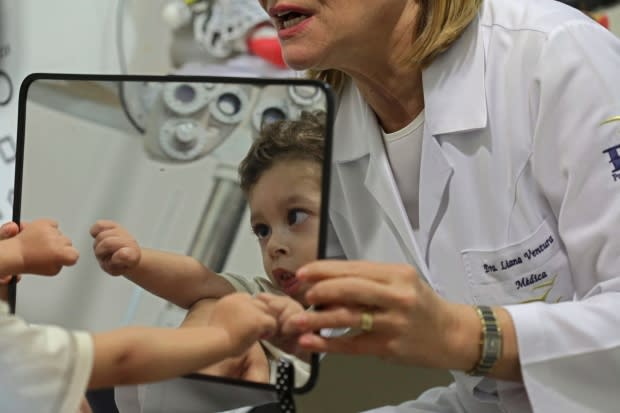Sainte-Justine Hospital opens new centre aimed at combating congenital infections
Many infectious diseases, from the human immunodeficiency virus (HIV) to Zika, can be transmitted from mother to child during pregnancy, childbirth or in the first days of an infant's life — congenital and perinatal infections that, left untreated, can be life altering or even life ending for the baby.
To help prevent and treat such infections, Montreal's Sainte-Justine Hospital, the largest mother and child centre in Canada, has set up a new multidisciplinary centre where expectant or new mothers and their babies can get all the medical services they need in one place.
The Women and Children's Infectious Diseases Centre (CIME) has brought together all of the hospital's experts to follow at-risk mothers and their babies from pregnancy through the child's first 18 months.
"We want to prevent infections, because some of these infections are fatal to babies," said Dr. Fatima Kakkar, who co-directs the new centre with Dr. Isabelle Boucoiran. "There will be in-utero losses, or children can die right after birth from some of these infections."
No longer 'separate silos'
The obstetrics and pediatric teams have traditionally "worked in two separate silos," Kakkar said, but now they will be collaborating alongside pharmacists, nutritionists, physiotherapists, social workers and other specialists to care for mother and baby.
"Moms and their babies are going to be seen at one place by the same care providers," she said.
The hospital cares for 150 to 200 mothers a year who have an infectious disease, she said — a number that may go up as prenatal testing improves.
"If a mother has an infection, the biggest question is 'what will happen to my baby?'" said Kakkar.
"She'll have a lot of anxiety — a lot of questions — so it is really important that we help to address this before the baby is born."
She said for expectant mothers from outside Montreal who choose to give birth close to home, the CIME team will be in touch with local doctors, while providing follow-up care in Montreal.
Researching treatment strategy
In the case of some infectious diseases, a pregnant, infected woman can be treated before giving birth to prevent the infection from spreading to her child.
In other cases, such as cytomegalovirus (CMV) — a common respiratory virus associated with diseases such as mononucleosis and pneumonia — it can be challenging.

CMV affects one in every 100 births in Quebec, she said, and there are no "good preventative strategies" to keep it from spreading from mother to baby, Kakkar said.
However, her research team at Sainte-Justine, a Université de Montréal teaching hospital, is looking for new therapies to treat CMV.
CIME is hosting a symposium on CMV Wednesday, bringing physicians together from across the province to zero in on the virus, and its prevention and treatment.
HIV/AIDS pioneer
No matter the type of infection, Kakkar said, the first step is to do the proper tests on the mother, diagnosis her infection and then "treat her optimally during pregnancy to make sure we don't have transmission to the baby."
Sainte-Justine Hospital has long been at the forefront of congenital infections.
From the onset of the HIV/AIDS crisis in the early 1980s, the hospital pioneered the prevention of mother-to-child transmission and provided the care and support needed for affected families.


